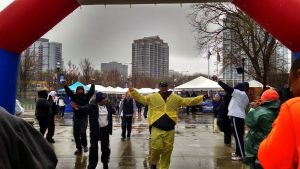Music blared from the turntable. The lights flashed inside the home, and a hoard of teens boogied like they were on the dance floor. This was one of the perks of being the daughter of deaf parents; their doorbell made the lights flash like a disco, explained Arlene Malinowski, an actress.
“We would do horrible things to my parents,” Malinowski said. “We would ring the doorbell, because the lights flash on and off, again and again and again and then turn on disco music and dance. It was like being in the club. And if you did it long enough, you could get half a song in. See, you can’t make this shit up.”
Manipulating her parents’ doorbell for her own amusement was just one of the many things she did, and still does, to use her parents’ deafness to her advantage.
Malinowski, now 52, is a CODA, or a Child of Deaf Adults. She is, by default, a member of the deaf community, but she is also her parents’ arm into the hearing world.
“I occupy this weird space between the hearing world and the deaf world,” Malinowski said. “It’s kind of a third world, with a foot in both.”
Since childhood she has utilized and celebrated her unique upbringing in her work and life.
She has turned her rich experiences growing up with deaf parents into a series of one-woman shows chronicling the tough times, interesting moments and funny stories.
Arlene has a big personality, on and off stage. She attributes it to growing up with parents that used American Sign Language, commonly abbreviated as ASL. The language is very expressive, relying heavily on face and body movement. This, she says, is why she’s bigger than life.
“I am a deaf girl in a hearing body,” Malinowski said. “People who don’t know me think I’m the biggest, loudest thing in the room. Once when I saw myself on a video tape, I almost died. I was like, ‘I look like Big Bird on crack!’ But in a room of deaf people, I am like so normal!”
When talking, she can be heard above the loud music in a café. She uses her hands, she stares and she’s blunt. Deaf people are truly bigger and bolder in terms of communication, Malinowski said.
“Arlene is loud and animated, a function of ASL as her first language,” said Dan Clark, Arlene’s husband of nearly 25 years. “She is very direct in her conversations, a function of growing up in a deaf, New Jersey household. I’m not sure which is more the factor driving her conversational style.”
Although she is quick to share stories about how she bugged her parents and other funny moments that went in hand with having deaf parents, there were times where she struggled to understand them. This is what inspired the title of her first play, “What Does the Sun Sound Like?”
“I was an awful 12-year-old,” Malinowski said. “I was a lipstick-wearing, cigarette-stealing, parent-hating, boy-crazy preteen in a Catholic school uniform.”
Malinowski said it was during that phase when it dawned on her just how different her parents were from hearing people.
“We were at the kitchen table, and that summer had been especially rainy and especially grey, which matched my moods perfectly,” Malinowski said. “My father and I were in this big fight, and then the sun kind of broke free from the clouds, and it just wiped out the entire sky. My father turned to me and asks, ‘what does sun sound like?’ He had no idea. I said, ‘The sun doesn’t sound like anything.’”
Her father was confused, as in books it often says, “the sun hits the sidewalk,” when describing the sun.
“He talks to me and says, ‘so you can see the rain and hear the rain and you can see the snow but there is no sound with snow, and you can’t see the wind but you can hear the wind?’ and it was this moment where, quite literally, the clouds parted for me,” Malinowski said.
“And I was like, I will never understand that it is more than just language. It is everything. Not knowing that the sun made a sound when it came out. That’s astonishing to me. It’s really the cornerstone of my first show. It’s this (signs the ASL sign for heart),” Malinowski said.
The tagline for the show is, “The totally true tales of a hearing daughter raised in a Deaf family and community.”
As a kid, Arlene was tasked with many responsibilities that most people don’t experience until adulthood. When she was able to speak, she became an interpreter for her parents, as she was the oldest child in the family.
“This would force anyone to grow up embracing people, be outgoing and have no fear regarding any situation one has to deal with,” Clark said.
Her parents dealt with this delicate relationship with poise, and kept their role as parents, Malinowski said.
“I can’t imagine what it’s like having an 8-year-old tell you about the world,” Malinowski said. “They handled that with grace. I think that they did a really good job at letting me be an adult when I was young, but also reminding me that I was still a kid. ‘You may have just interpreted a house closing, but you’re still going to bed at 9:15,’”said Malinowski, quoting her parents.
This unique relationship can be hard to understand for a hearing family. Malinowski likens it to working on a farm as a child. “Your parents own a farm, you wake up when you’re five and feed the chickens! Do kids in the city do that? No!”
Sometimes this duty worked in her favor, as the interpreter gets to decide what the final product of the translation is. “Of course, who interprets parent-teacher conferences?” Malinowski said with a sly grin.
Her teacher said she was smart and interesting, two things that she was dying to hear.
“I couldn’t think of a better thing to be called. Then Mrs. O’Keef said, ‘But she talks entirely too much.’ And I turn and look right at my mother, and I sign, ‘but the boy behind her talks too much.’ It’s just two small signs, that can be done very surreptitiously. To this day, my mother thinks ‘Johnny George’ talks too much. That’s my bad girl story.”
Arlene is just as gutsy when performing in a show, getting noticed by the audience for her quirky behavior even before a show has started.
“I was sitting in the audience reading an interpreting book for homework and she came up behind me and started playing with my hair,” said Alyssa Benson, an ASL-English interpretation major at Columbia College. Malinowski did not know Benson.
The on-stage performance proved to be just as memorable for Benson.
“The show was simply amazing. The way she portrayed the many cultural differences between the deaf and hearing worlds was unlike anything I’ve ever seen,” Benson said. “The CODA experience can be a frustrating challenge since they become stuck in-between the two cultures, but she still managed to bring light to the subject.”
Because her shows are about something that personally affects her, she can relate to her audience, notes Malinowski’s close friend Ken Ehlen.
“She has a lot of skill,” Ehlen said. “The roles she takes seem to have some personal connection to her. She draws a lot of attention, and uses that attention to make other people feel [good]… she’s always generous to other people. She kind of spreads that attention around.”
Her next show will debut March 25-27 during the Works in Progress program at Millennium Park, the second in a trilogy of shows entitled “Aiming for Sainthood.”
The show will be done in sign, spoken English, Pidgin English and deaf voice. Deaf voice, as Malinowski explains, is the accented voice that deaf people sometimes have due to their inability to hear.
“We’re the only ones who can do it, because that’s our birthright,” Malinowski said. “It is done only with the greatest fondness. Oh, and hearing people can’t do it because that would be mocking.”
To mock is certainly not Arlene’s goal. She is a people person on every level, Clark said.
“She loves to be with people and is usually happiest when she is talking and interacting in a group,” Clark said. “Friends or strangers, it doesn’t matter. You can verify this by viewing our phone bills.”
She is, as all people are, the complicated outcome of her parents.
“I am my parents’ proudest legacy,” Malinowski said. “They have proven to the hearing world that they can raise a hearing child. That they can raise a successful child, hearing or not, that’s their statement to their world: ‘I’m not less than, I have raised a successful citizen of the world.’”










Be First to Comment